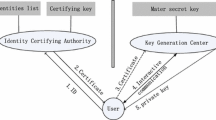Abstract
Key escrow is a major drawback of identity-based encryption (IBE). The key generation centre (KGC) can generate the user secret key of any user by using the master secret key and the user’s identity. This paper presents a systematic study of what it takes to prevent a malicious KGC from decrypting a ciphertext encrypted for an honest user, which covers the case for certificateless encryption, and shows the impossibility of ideal escrow-free IBE, unless there is uncertainty in the user’s identity.
Our study also explains the underpinning idea of anonymous ciphertext indistinguishability (ACI), formalized by Chow in PKC 2009. An ACI-secure IBE prevent a KGC (or any logical entity which get holds of the master secret key, such as the collusion of a number of authorities holding the sufficient number of master secret’s shares) from decrypting if it does not know the intended recipient of the ciphertext, a guarantee that none of the existing attempts in the literature can provide.
The notion of ACI crucially relies on the privacy of user’s identity in the eyes of the KGC. The only privacy leakage allowed in Chow’s model is via querying an embedded-identity encryption oracle. In this paper, we strengthen his model to allow arbitrary bounded leakage of the recipient’s identity. We also give a generic construction on how to achieve this notion when the identity has enough entropy.
The first author is supported by the HKU Small Project Funding under Grant No. 201109176192. The third author is supported by the Early Career Scheme and the Early Career Award of the Research Grants Council, Hong Kong SAR (CUHK 439713), and Direct Grant (4055018) of the Chinese University of Hong Kong.
Access this chapter
Tax calculation will be finalised at checkout
Purchases are for personal use only
Preview
Unable to display preview. Download preview PDF.
Similar content being viewed by others
References
Shamir, A.: Identity-based cryptosystems and signature schemes. In: Blakely, G.R., Chaum, D. (eds.) CRYPTO 1984. LNCS, vol. 196, pp. 47–53. Springer, Heidelberg (1985)
Boneh, D., Franklin, M.: Identity-based encryption from the weil pairing. In: Kilian, J. (ed.) CRYPTO 2001. LNCS, vol. 2139, pp. 213–229. Springer, Heidelberg (2001)
Al-Riyami, S.S., Paterson, K.G.: Certificateless public key cryptography. In: Laih, C.-S. (ed.) ASIACRYPT 2003. LNCS, vol. 2894, pp. 452–473. Springer, Heidelberg (2003)
Chow, S.S.M.: Certificateless Encryption. In: Identity-Based Cryptography, pp. 135–155. IOS Press (2008)
Dent, A.W.: A Survey of Certificateless Encryption Schemes and Security Models. Int. J. Inf. Sec. 7(5), 349–377 (2008)
Gentry, C.: Certificate-based encryption and the certificate revocation problem. In: Biham, E. (ed.) EUROCRYPT 2003. LNCS, vol. 2656, pp. 272–293. Springer, Heidelberg (2003)
Girault, M.: Self-certified public keys. In: Davies, D.W. (ed.) EUROCRYPT 1991. LNCS, vol. 547, pp. 490–497. Springer, Heidelberg (1991)
Chow, S.S.M.: Removing escrow from identity-based encryption. In: Jarecki, S., Tsudik, G. (eds.) PKC 2009. LNCS, vol. 5443, pp. 256–276. Springer, Heidelberg (2009)
Goyal, V.: Reducing trust in the PKG in identity based cryptosystems. In: Menezes, A. (ed.) CRYPTO 2007. LNCS, vol. 4622, pp. 430–447. Springer, Heidelberg (2007)
Au, M.H., Huang, Q., Liu, J.K., Susilo, W., Wong, D.S., Yang, G.: Traceable and retrievable identity-based encryption. In: Bellovin, S.M., Gennaro, R., Keromytis, A.D., Yung, M. (eds.) ACNS 2008. LNCS, vol. 5037, pp. 94–110. Springer, Heidelberg (2008)
Goyal, V., Lu, S., Sahai, A., Waters, B.: Black-box accountable authority identity-based encryption. In: CCS 2008, pp. 427–436. ACM (2008)
Yuen, T.H., Susilo, W., Mu, Y.: How to construct identity-based signatures without the key escrow problem. Int. J. Inf. Sec. 9(4), 297–311 (2010)
Chow, S.S.M., Boyd, C., González Nieto, J.M.: Security-Mediated Certificateless Cryptography. In: Yung, M., Dodis, Y., Kiayias, A., Malkin, T. (eds.) PKC 2006. LNCS, vol. 3958, pp. 508–524. Springer, Heidelberg (2006)
Lewko, A., Rouselakis, Y., Waters, B.: Achieving leakage resilience through dual system encryption. In: Ishai, Y. (ed.) TCC 2011. LNCS, vol. 6597, pp. 70–88. Springer, Heidelberg (2011)
Yuen, T.H., Chow, S.S.M., Zhang, Y., Yiu, S.M.: Identity-based encryption resilient to continual auxiliary leakage. In: Pointcheval, D., Johansson, T. (eds.) EUROCRYPT 2012. LNCS, vol. 7237, pp. 117–134. Springer, Heidelberg (2012)
Boneh, D., DeMillo, R.A., Lipton, R.J.: On the importance of checking cryptographic protocols for faults (extended abstract). In: Fumy, W. (ed.) EUROCRYPT 1997. LNCS, vol. 1233, pp. 37–51. Springer, Heidelberg (1997)
Biham, E., Shamir, A.: Differential fault analysis of secret key cryptosystems. In: Kaliski Jr., B.S. (ed.) CRYPTO 1997. LNCS, vol. 1294, pp. 513–525. Springer, Heidelberg (1997)
Bellare, M., Paterson, K.G., Thomson, S.: RKA security beyond the linear barrier: IBE, encryption and signatures. In: Wang, X., Sako, K. (eds.) ASIACRYPT 2012. LNCS, vol. 7658, pp. 331–348. Springer, Heidelberg (2012)
Chow, S.S.M.: New Privacy-Preserving Architectures for Identity-/Attribute-based Encryption. PhD thesis, New York University (2010)
Dodis, Y., Lewko, A.B., Waters, B., Wichs, D.: Storing Secrets on Continually Leaky Devices. In: Ostrovsky, R. (ed.) FOCS 2011, pp. 688–697. IEEE (2011)
Author information
Authors and Affiliations
Editor information
Editors and Affiliations
Rights and permissions
Copyright information
© 2013 Springer-Verlag Berlin Heidelberg
About this paper
Cite this paper
Yuen, T.H., Zhang, C., Chow, S.S.M., Liu, J.K. (2013). Towards Anonymous Ciphertext Indistinguishability with Identity Leakage. In: Susilo, W., Reyhanitabar, R. (eds) Provable Security. ProvSec 2013. Lecture Notes in Computer Science, vol 8209. Springer, Berlin, Heidelberg. https://doi.org/10.1007/978-3-642-41227-1_8
Download citation
DOI: https://doi.org/10.1007/978-3-642-41227-1_8
Publisher Name: Springer, Berlin, Heidelberg
Print ISBN: 978-3-642-41226-4
Online ISBN: 978-3-642-41227-1
eBook Packages: Computer ScienceComputer Science (R0)




